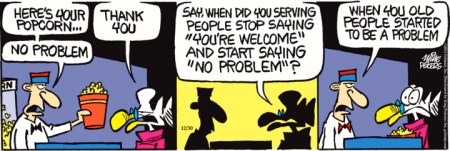If you wanna be one of the guys, you gotta talk like one of the guys. The lesson of this masculinity cartoon by Hartley Lin in the New Yorker of 4/25 & 5/2:
Being one of the boys here is fitting into (what I’ve called) a male band, a group of mutually supportive, like-minded, and like-acting bros. (See the section on “The social organization of men in modern America” in my 1/6/21 posting “Another 1996 Superbowl moment”.) Like-acting because the band monitors its members’ behavior and enforces the band norms, which the band members see as matters of masculinity display.
Two kinds of masculinity display. A core type that I’ll call negative masculinity display, characterized by avoidance of anything that smacks of women or girls. And a more purely conventional type — positive masculinity display — characterized by adhering to local norms of behavior that are simply “how guys do it” — stuff that males pick up from other males. (The terminology is loosely based on negative and positive politeness; see the Wikipedia section on the politeness types, following Brown & Levinson.)
Green Hand (who’s a green ‘inexperienced’ ranch hand) has come up short on a linguistic bit of positive masculinity in this band of ranch hands: as the older hand explains to him in an avuncular way, the appropriate bro-xclamation there for expressing exuberance is yee-haw, not yahoo. Now, if Green Hand had used yoo-hoo, he would have been off on two linguistic counts: in negative masculinity (yoo-hoo is fairly strongly gendered, for use primarily by women); and in actual semantic content, yoo-hoo being a call, not an expression of emotion.






